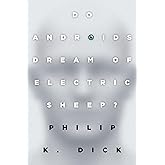
Download the free Kindle app and start reading Kindle books instantly on your smartphone, tablet, or computer - no Kindle device required.
Read instantly on your browser with Kindle for Web.
Using your mobile phone camera - scan the code below and download the Kindle app.

OK
 Audible sample Sample
Audible sample Sample 


The Minority Report Hardcover – August 31, 2013
The Minority Report is the fourth installment of a uniform, five-volume edition of The Collected Stories of Philip K. Dick. This generous collection contains 18 stories and novellas written between 1954 and 1963, years in which Dick produced some of his most memorable work, including such novels as Martian Time Slip and the Hugo Award-winning The Man in the High Castle. Included here are 'Autofac,' a post-apocalyptic tale in which humans share the devastated Earth with the machines they have created but no longer fully control; 'The Mold of Yancy,' a portrait of a world reduced to bland conformity by the vapid--and ubiquitous--pronouncements of a virtual demagogue; and 'The Days of Perky Pat,' another post-apocalypse story in which Earth s survivors find temporary solace in the Perky Pat game, a game rooted in the images and memories of a world that no longer exists. Finally, the classic title story, filmed by Steven Spielberg as Minority Report, posits a future state in which the 'Precrime' bureau, aided by a trio of pre-cognitive mutants, arrests and incarcerates 'criminals' for crimes they have not yet committed. Like its predecessors, this extraordinary volume is a treasure house of story, offering narrative pleasures and intellectual excitement in equal measure.
- Print length472 pages
- LanguageEnglish
- PublisherSubterranean
- Publication dateAugust 31, 2013
- Dimensions7 x 1.75 x 9.5 inches
- ISBN-101596065982
- ISBN-13978-1596065987
The Amazon Book Review
Book recommendations, author interviews, editors' picks, and more. Read it now.
Similar items that may deliver to you quickly
Editorial Reviews
From Booklist
From the Inside Flap
Product details
- Publisher : Subterranean; Deluxe Hardcover edition (August 31, 2013)
- Language : English
- Hardcover : 472 pages
- ISBN-10 : 1596065982
- ISBN-13 : 978-1596065987
- Item Weight : 2 pounds
- Dimensions : 7 x 1.75 x 9.5 inches
- Best Sellers Rank: #5,813,538 in Books (See Top 100 in Books)
- #2,862 in Science Fiction Short Stories
- #12,097 in Science Fiction Anthologies (Books)
- #49,164 in Short Stories Anthologies
- Customer Reviews:
About the author

Over a writing career that spanned three decades, Philip K. Dick (1928-1982) published 36 science fiction novels and 121 short stories in which he explored the essence of what makes man human and the dangers of centralized power. Toward the end of his life, his work turned toward deeply personal, metaphysical questions concerning the nature of God. Eleven novels and short stories have been adapted to film; notably: Blade Runner (based on Do Androids Dream of Electric Sheep?), Total Recall, Minority Report, and A Scanner Darkly. The recipient of critical acclaim and numerous awards throughout his career, Dick was inducted into the Science Fiction Hall of Fame in 2005, and in 2007 the Library of America published a selection of his novels in three volumes. His work has been translated into more than twenty-five languages.
Customer reviews
Customer Reviews, including Product Star Ratings help customers to learn more about the product and decide whether it is the right product for them.
To calculate the overall star rating and percentage breakdown by star, we don’t use a simple average. Instead, our system considers things like how recent a review is and if the reviewer bought the item on Amazon. It also analyzed reviews to verify trustworthiness.
Learn more how customers reviews work on Amazon-
Top reviews
Top reviews from the United States
There was a problem filtering reviews right now. Please try again later.
Anderton is the commissioner and founder of Precrime, the police force that arrests criminals before they have a chance to commit crime. Computers manipulate “gibberish” from three “precogs,” each one seeing into a possible future, and Anderton determines whether a crime will be committed. When two or more “precogs” agree on an outcome, the resulting agreement is a majority report and the police can act on it. The system has been working fine until one day a majority report indicates Anderton will murder a retired general.
When he reviews the reports and tried to understand how the minority report differs from the majority. He realizes the fact that he, unlike other criminals, could see the report has altered the results. The first report gives the situation where he doesn’t know he will kill the general and in this scenario he would kill the general to prevent the military from taking over. But the second report, the minority report, considers his seeing the first report and therefore changing the outcome and in this scenario he wouldn’t kill the general. Then the third report, which consider his seeing the minority report, indicates he would kill the general. The very fact that he could see into the “future” changes it.
In this story, Philip K. Dick questions the validity of “seeing into the future.” If we could “see into the future,” we have the opportunity to change that future and therefore create a different future. Hence, the paradox.
I enjoy reading Philip K. Dick because his stories spurs to think about issues in our existence. In Do Androids Dream of Electric Sheep?, it is the nature of being alive and being human. In Ubik, it the nature of reality. And here, it is the paradox of knowing the future.
This book is essentially a reprint of volume four of the 1987 Underwood/Miller collected stories, with new typesetting, typography, dust jacket, and getting rid of the James Tiptree, Jr. introduction. The stories span a rather arbitrarily large chronological period in Dick's career, writing from late 1954 to 1963, when he mostly worked on novels.
Unfortunately, this reprint series has been a missed opportunity to improve on the original collection (for instance, correcting errors in the texts, adding uncollected stories that were later expanded into novels, updated framing material, juvenilia, etc.) And the first volume was badly botched, with the second one also having problems. So I can't recommend this book, except for the intrinsic merit of the stories, which you can find elsewhere--adequate paperbacks editions of all five volumes of Collected Stories remain in print.
There are 19 short stories, and it reads as a book should. Contents:
Autofac
Service Call
Captive Market
The Mold of Yancy
The Minority Report
Recall Mechanism
The Unreconstructed M
Explorers We
War Game
If There Were No Benny Cemoli
Novelty Act
Waterspider
What the Dead Men Say
Orpheus with Clay Feet
The Days of Perky Pat
Stand-By
What'll We Do with Ragland Park?
Oh, to Be a Blobel!
All this refers to the Underwood-Miller and Millenium-Gollancz editions. There is another five-volume collection by Citadel-Twilight, with basically the same stories.
Top reviews from other countries
Dennoch sehr empfehlenswert. Die Geschichten haben einen zeitlosen Charakter, und man ist immer wieder erstaunt wie aktuell sie wirken.
Das Buch ist außerdem eher klein und kompakt und eignet sich daher gut als Reiselektüre.
Reviewed in Germany on October 13, 2023
Dennoch sehr empfehlenswert. Die Geschichten haben einen zeitlosen Charakter, und man ist immer wieder erstaunt wie aktuell sie wirken.
Das Buch ist außerdem eher klein und kompakt und eignet sich daher gut als Reiselektüre.


Dick a eu en effet l’inestimable honneur d’être l’un des auteurs de science-fiction les plus adaptés au cinéma et maintenant par les chaînes du câble avec le seul inconvénient d’être mort quand le succès est enfin arrivé (la première adaptation notable, qui allait lancer sa mode, Blade Runner, est sortie juste après la mort de l’auteur et a d'ailleurs été un bide lors de sa sortie). Dans ce recueil, sur les neuf nouvelles qu’il comprend, quatre ont été adaptées au moins une fois en film. Excusez du peu. Comme je l’ai dit, "Minority Report" est la plus faible des quatre et a pourtant donné lieu au plus gros succès commercial parmi les films issus d’un livre de Dick. On peut également noter qu’en dehors de "Minority Report", les trois autres nouvelles impliquées ont donné lieu à des films de série B, y compris Total Recall, qu’on pourrait qualifier de série B bodybuildé, aussi bien pour le budget que les muscles de Schwarzenegger. Pourtant les textes de Dick qui ont servi à ces films assez quelconques sont sans exception remarquables. Evidemment, la concision et la force de la nouvelle originale, "We Can Remember It For You Wholesale" n’y sont plus du tout dans le film de Verhoeven et encore moins dans son remake qui atteint le point zéro de la créativité.
"Imposter", qui a donné le film "Impostor", est une très bonne nouvelle comme on en faisait dans les années 50, pas exagérément dicksienne donc. Le film est assez honorable mais dénué de tout cachet, tout comme l’adaptation de "Second Variety", intitulée "Screamers". C’est difficilement compréhensible, surtout dans ce dernier cas tant la novella (car il s’agit presque d’un roman) est excellente : dense, implacable, tirée au cordeau, rien que de l’os et du muscle. "Second Variety" est un des rares textes longs de Dick où il ne cède pas à son penchant pour les digressions ou les intrigues secondaires qui viennent parasiter et affaiblir le drame central (un excellent exemple de ce travers est le très bavard et embrouillé "Do Androïds Dream Of Electric Sheep ?" qui a donné lieu au chef d’œuvre de la SF "Blade Runner").
Les autres textes ne sont guère moins intéressants. J’ai pourtant un peu de mal avec "The Electric Ant", mais pour des raisons plus philosophiques qu’artistiques. Je n’aime pas les les histoires qui systématisent une idée, aussi bonne soit-elle, toujours au dépens des personnages. Mais comme je l’ai dit, la seule nouvelle vraiment ratée de Dick incluse dans ce recueil est celle qui donne son titre et sa couverture à ce très bon livre. Ironie dicksienne ou divine ?













